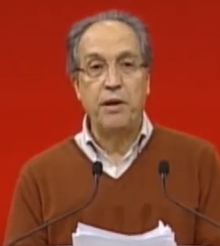Portuguese economist and politician
Carlos Alberto do Vale Gomes Carvalhas , GCC São Pedro do Sul , 9 November 1941) is a Portuguese economist and politician [ 1] Secretary-General of the Portuguese Communist Party (1993–2004), succeeding the historical leader Álvaro Cunhal .[ 2]
He was born to António José Bandeira Carvalhas (Baiões, São Pedro do Sul , 22 April 1915 – 4 February 1999) and Esmeraldina do Céu Gomes Quaresma (b. Moldes, Arouca , 9 July 1917). His father was a businessman and owner of the warehouse Discomer that served as a food retailer for the local shops.
He was a deputy of the Assembly of the Republic for two time periods[ 3] Portuguese presidency in 1991 , where he received 635,373 votes (12.92%).
On 5 October 2004, he announced his intention to resign. He was replaced by Jerónimo de Sousa on 27 November 2004, at the 17th Congress of the PCP.
His late second cousin was married to the 3rd Viscount of São Pedro do Sul .
Electoral history
Ballot: 13 January 1991
Candidate
Votes
%
Mário Soares 3,459,521
70.4
Basílio Horta 696,379
14.2
Carlos Carvalhas 635,373
12.9
Carlos Manuel Marques 126,581
2.6
Blank/Invalid ballots
180,214
–
Turnout
5,098,768 62.16
Source: Comissão Nacional de Eleições[ 4]
Ballot: 1 October 1995
Party
Candidate
Votes
%
Seats
+/−
PS
António Guterres 2,583,755
43.8
112 +40
PSD
Fernando Nogueira 2,014,589
34.1
88 –47
CDS–PP
Manuel Monteiro 534,470
9.1
15 +10
CDU
Carlos Carvalhas 506,157
8.6
15 –2
Other parties
152,790
2.6
0 –1
Blank/Invalid ballots
113,093
1.9
–
–
Turnout
5,904,854 66.30 230 ±0
Source: Comissão Nacional de Eleições[ 5]
Ballot: 10 October 1999
Party
Candidate
Votes
%
Seats
+/−
PS
António Guterres 2,385,922
44.1
115 +3
PSD
José Manuel Durão Barroso 1,750,158
32.3
81 –7
CDU
Carlos Carvalhas 487,058
9.0
17 +2
CDS–PP
Paulo Portas 451,643
8.3
15 ±0
BE
Francisco Louçã 132,333
2.4
2 new
Other parties
99,842
1.8
0 ±0
Blank/Invalid ballots
108,194
2.0
–
–
Turnout
5,415,102 61.02 230 ±0
Source: Comissão Nacional de Eleições[ 6]
Ballot: 17 March 2002
Party
Candidate
Votes
%
Seats
+/−
PSD
José Manuel Durão Barroso 2,200,765
40.2
105 +24
PS
Eduardo Ferro Rodrigues 2,068,584
37.8
96 –19
CDS–PP
Paulo Portas 477,350
8.7
14 –1
CDU
Carlos Carvalhas 379,870
6.9
12 –5
BE
Francisco Louçã 153,877
2.8
3 +1
Other parties
88,542
1.6
0 ±0
Blank/Invalid ballots
107,774
2.0
–
–
Turnout
5,473,655 61.48 230 ±0
Source: Comissão Nacional de Eleições[ 7]
References
International National People
